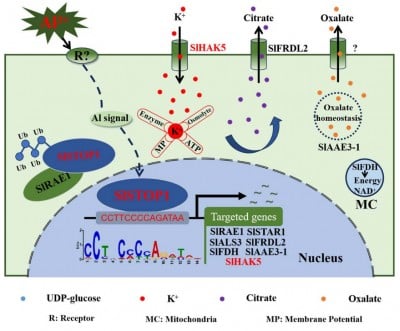Aluminum toxicity is a major challenge in agriculture, especially in acidic soils with pH levels below 5.5. Soluble aluminum ions (Al³⁺) can rapidly damage plant roots, hindering nutrient uptake and reducing yields. Plants have evolved multiple strategies to cope with this stress, including secreting organic acids like citrate to bind aluminum ions externally. The transcription factor STOP1 has emerged as a master regulator of such defense mechanisms in model species like Arabidopsis and rice. However, its roles in tomato have remained largely unexplored. Due to these gaps in understanding, there is a pressing need to investigate the regulatory networks of STOP1 in tomato under aluminum stress.
Researchers from Yunnan Agricultural University and collaborators have identified a critical genetic mechanism by which tomato plants combat aluminum toxicity in acidic soils. Published (DOI: 10.1093/hr/uhae282) on October 2, 2024, in Horticulture Research, the study demonstrates that SlSTOP1, a transcription factor, activates SlHAK5, a potassium transporter gene, to enhance citrate secretion from roots under aluminum stress. The discovery sheds new light on how tomato plants detoxify harmful aluminum ions, providing a molecular basis for improving tomato tolerance in acidic environments.
Using a combination of DAP-seq and RNA-seq techniques, the researchers mapped genome-wide targets of SlSTOP1 and identified 39 aluminum-responsive genes, including known aluminum tolerance players like SlALS3 and SlFRDL2. Notably, SlHAK5 was identified as a novel direct target of SlSTOP1. Functional analysis showed that SlHAK5 knockout mutants exhibited increased aluminum sensitivity, with significantly reduced citrate secretion from roots. Citrate, a key organic acid, binds to aluminum ions in the rhizosphere, reducing their toxicity. Interestingly, while SlHAK5 is known to help in potassium uptake under deficiency conditions, this study showed its induction by aluminum stress is independent of potassium starvation. The researchers confirmed SlSTOP1’s binding to the SlHAK5 promoter via luciferase assays and EMSA, and demonstrated that overexpressing SlSTOP1 boosts SlHAK5 expression. Furthermore, aluminum-induced expression of SlHAK5 peaked in the apical root zone, the site most vulnerable to aluminum toxicity. The study proposes that SlHAK5 helps maintain physiological conditions favorable for citrate exudation, reinforcing the plant’s ability to tolerate aluminum. These insights highlight a previously unknown role of SlHAK5 and offer promising genetic tools for breeding resilient tomato varieties.
“Our research demonstrates that the SlSTOP1–SlHAK5 module is crucial for aluminum tolerance in tomato, particularly through enhanced citrate secretion,” said Dr. Jianli Yang, corresponding author of the study. “This discovery not only expands our understanding of how tomatoes adapt to acidic soils but also identifies valuable genetic targets for future crop improvement. With acidic soils covering over 40% of global arable land, these findings have broad agricultural significance.”
The discovery of the SlSTOP1–SlHAK5 regulatory pathway opens new avenues for developing aluminum-resistant tomato cultivars suited to acidic soil conditions. Genetic manipulation or marker-assisted selection of these genes can improve yield stability in regions with poor soil quality, such as parts of China, South America, and sub-Saharan Africa. Additionally, the study provides a framework for exploring similar regulatory modules in other crops. As soil acidification becomes more widespread due to climate change and intensive farming, enhancing aluminum tolerance through molecular breeding will be vital for global food security.
###
References
DOI
Original Source URL
https://doi.org/10.1093/hr/uhae282
Funding information
This work was financially supported by grants of the National Natural Science Foundation of China (32372803), and the Natural Science Foundation of Zhejiang Province (LZ22C150001).
About Horticulture Research
Horticulture Research is an open access journal of Nanjing Agricultural University and ranked number one in the Horticulture category of the Journal Citation Reports ™ from Clarivate, 2023. The journal is committed to publishing original research articles, reviews, perspectives, comments, correspondence articles and letters to the editor related to all major horticultural plants and disciplines, including biotechnology, breeding, cellular and molecular biology, evolution, genetics, inter-species interactions, physiology, and the origination and domestication of crops.
